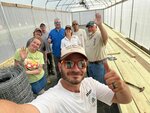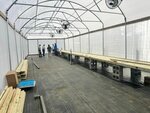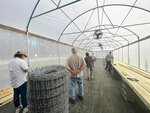After a lot of planning, building and hard work, Cooper Farm is a certified citrus nursery.
In December 2023, the state of Alabama was designated as a commercial citrus-producing area. The USDA …
This item is available in full to subscribers.
Please log in to continue |



After a lot of planning, building and hard work, Cooper Farm is a certified citrus nursery.
In December 2023, the state of Alabama was designated as a commercial citrus-producing area. The USDA Animal and Plant Health Inspection Service (APHIS) revised the code of federal regulations to provide Alabama with federal protections from citrus pests and diseases like citrus canker.
Chase Cooper, co-owner of Cooper Farm and chief greenhouse builder at Cooper Farm, explained that the regulation change means big-box stores and commercial nurseries will be required to buy citrus trees from a USDA-certified facility.
For Cooper Farm, obtaining their USDA and Alabama Department of Agriculture certification means they will be able to ship citrus trees to 43 states and sell their citrus trees to retailers.
While the Cooper family's citrus trees may be purchased by big-box stores and shipped to other states, the certification is also beneficial for local residents. Buying citrus plants from a reputable, licensed nursery ensures that you are likely purchasing a disease-free plant, resulting in a healthier and more productive tree.
To earn the certification, Chase and Kitti Cooper along with two friends, constructed a greenhouse built to extremely specific requirements. Chase said he has built many greenhouses, but this was the hardest.
“Conforming to these regulations was a massive step for me and it cost a lot of money just to buy all the extra products and stuff that I needed,” Cooper said.
The 20-foot by 80-foot greenhouse is designed to prevent any bugs that could harm the citrus stock from entering. Chase explained that before someone even steps inside, they must go through a sanitary spray that prevents pathogens, mold and insects. As soon as the door is activated, a positive air force blows any bugs flying around out. The screen used to construct the structure is less than 0.3 square millimeters which is small enough that no pests can slip through.
Citrus-producing regions in the United States, such as Coastal Alabama, face significant risks from invasive pests and diseases due to their proximity to international ports and warm climates. The introduction of any of these pests or diseases could potentially harm citrus acreage nationwide. The Cooper family's new certification promises a safeguard for future generations, ensuring a steady supply of delicious orange juice for breakfast for our children, grandchildren and beyond.
However, achieving certification as a citrus nursery and greenhouse is just the first step. Now they need to grow their certified stock which will begin immediately.
“My certified stock will be able to be grafted on to in 60 to 90 days,” Chase said. “Then once I graph my varieties onto those rootstocks, I can push them to size in probably 90 days.”
Now that the first greenhouse is complete and certified, Chase is set to start on a much larger, 30-feet by 272-feet greenhouse. Once that facility is complete and certified, he will have space for 51,000 trees.
Cooper Farm is a family-owned and operated garden center that grew from Kitti’s love of growing food and plants. The Coopers share their love of growing with the community and now they will be able to share their citrus trees with the country. This is a big achievement for this family operation.
“I am still in shock that we went through and actually completed everything because it’s just me and my wife and a couple of friends that help us,” Chase said. “We’ve put everything that we’ve got financially and physically just to be able to get as far as we have.”
Want to learn more about growing your own citrus trees and other plants? Make sure to catch Kitti Cooper’s column “Cultivating the Coast with Kitti Cooper” in Gulf Coast Media’s Wednesday editions of The Courier, The Islander and The Onlooker as well as online at gulfcoastmedia.com/kitti-cooper/.